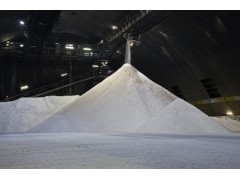Calcium chloride is used in concrete mixes to accelerate the initial setting, but chloride ions lead to corrosion of steel rebar, so it should not be used in reinforced concrete. The anhydrous form of calcium chloride may also be used for this purpose and can provide a measure of the moisture in concrete. Calcium chloride is included as an additive in plastics and in fire extinguishers, in wastewater treatment as a drainage aid, in blast furnaces as an additive to control scaffolding (clumping and adhesion of materials that prevent the furnace charge from descending), and in fabric softener as a thinner. The exothermic dissolution of calcium chloride is used in self-heating cans and heating pads. In the oil industry, calcium chloride is used to increase the density of solids-free brines. It is also used to provide inhibition of swelling clays in the water phase of invert emulsion drilling fluids. CaCl2 acts as flux material (decreasing melting point) in the Davy process for the industrial production of sodium metal, through the electrolysis of molten NaCl. Similarly, CaCl2 is used as a flux and electrolyte in the FFC Cambridge process for titanium production, where it ensures the proper exchange of calcium and oxygen ions between the electrodes. Calcium chloride is also used in the production of activated charcoal. Calcium chloride is also an ingredient used in ceramic slipware. It suspends clay particles so that they float within the solution making it easier to use in a variety of slip casting techniques.















